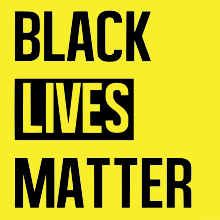Black Lives Matter
This article needs to be updated. (September 2020) |
Black Lives Matter (BLM) is an international[1] activist group. They originated in the African-American community. They are against violence and systemic racism by white police officers against black people.
 | |
| Formation | July 13, 2013 |
|---|---|
| Founders | |
| Type | Activist organization |
| Purpose | Anti-racist advocacy and protest |
| Location |
|
Key people | |
| Website | blacklivesmatter |

History
changeThe movement began in 2013 with the hashtag #BlackLivesMatter on social media. It started after the acquittal of George Zimmerman in the death of Trayvon Martin. It became famous for street demonstrations following the deaths of Michael Brown and Eric Garner. The former sparked riots and unrest in Ferguson, Missouri. The latter led to protests all over the United States.[2]
After the Ferguson protests, participants in Black Lives Matter demonstrated against other African-Americans' deaths, such as Freddie Gray, Sandra Bland, Laquan McDonald, Philando Castile and Alton Sterling.
In 2020, during the George Floyd Protests, Black Lives Matter became much more widely accepted. Black Lives Matter filed a lawsuit against the police department of Seattle, Washington for violence against protesters.[3]
"It's now something where the Mitt Romneys of the world can join in, and that was something unimaginable back in 2014," said Justin Hansford, executive director of Howard University's Thurgood Marshall Civil Rights Center. "That is the result of six years of hard work by people who are in the movement and have put forward so many discussions that really changed people’s hearts and minds." Hansford was also an activist in Ferguson.[4]
Criticism
changeThe movement has also been criticized. In the New York Times, Deroy Murdock asked about the true number of black people killed by police, and about the way the BLM movement reported these killings. He wrote: "But the notion that America’s cops simply are gunning down innocent black people is one of today's biggest and deadliest lies".[5] Some of the black leaders of the American civil rights movement criticized the tactics of the BLM movement.[6] Glenn Loury, a professor for economics, warned about focusing on police violence against black people; the other side would only use this to compile statistics; in these statistics black people will be overrepresented. According to Loury, it would be better to reform social structures, so that people could benefit, irrespective of skin color. One of the examples he gave was early-age education.[7]
References
change- ↑ "Black Lives Matter Movement". CNN. Retrieved Sep 24, 2016.
- ↑ "Black Lives Matter Movement Changes America". CBS News. Retrieved Sep 24, 2016.
- ↑ Jack Brewster (June 10, 2020). "Seattle Protesters Take Over City Hall, Demand Mayor's Resignation". Forbes. Retrieved June 11, 2020.
- ↑ Jose A. Del Real; Robert Samuels; Tim Craig (June 9, 2020). "How the Black Lives Matter movement went mainstream". Washington Post. Retrieved June 11, 2020.
- ↑ Murdock, Deroy (2015-11-07). "Black Lives Matter's numbers are bogus". New York Post. Retrieved 2021-05-02.
- ↑ "Longtime L.A. civil rights leaders dismayed by in-your-face tactics of new crop of activists". Los Angeles Times. 2015-10-30. Retrieved 2021-05-02.
- ↑ Loury, Glenn (2015-11-06). "Loury: The political inefficacy of saying, 'Black lives matter'". Brown Daily Herald. Retrieved 2021-05-02.